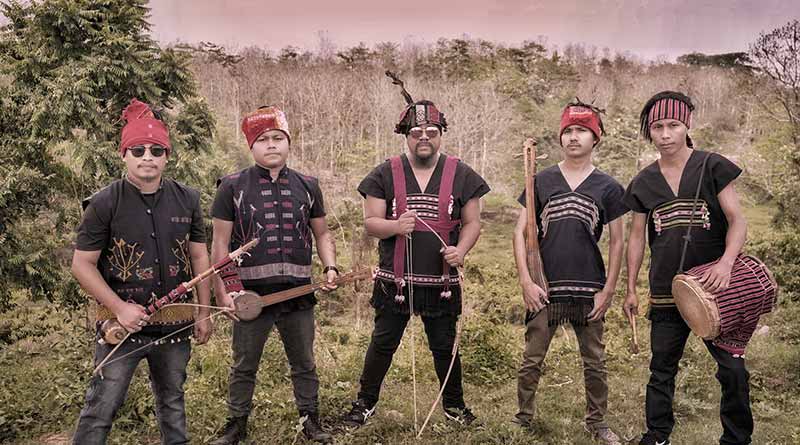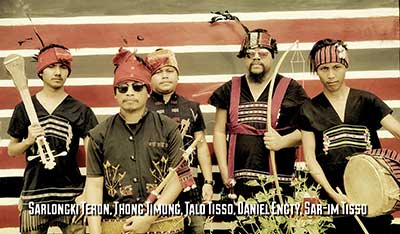Jambili: Reviving folk songs

Jambili is a folk-rock band that was formed mainly to preserve and bring back Karbi folk songs that were almost forgotten by the people from district Diphu in Assam. The idea to form a band was conceived when school friends came together and played for the first time, trying to bring back the folk songs that were almost forgotten.
Daniel Engty Kathar of Excruciator fame whose songs are very popular among fans of all ages and has also played with Grammy-nominated band from Dimapur, Abiogenesis, which has performed in Thailand, Russia, Bhutan and Myanmar, is the force behind Jambili. He brought together a few friends and formed the band in 2007. Daniel also played a role in the Abiogenesis Films Enter My World as an Ahom warrior.
Their current line-up comprises Daniel Engty on vocals/kum dengdong/flute /guitars/krongchui (jaws harp), Thong Timungon vocals/Chenkpi/Chenkso/Chenk buruk (all traditional drums)/kum li eng, Talo Tisso on guitars/vocals/chenkpi, Sarlongki Teron on bass guitar/vocals and Sar-im Tisso on drums/chenkburuk/vocals. Verus Ferreira had a telephone chat with the band members. Excerpts.
Can you tell us how the band was formed?
Daniel: In 2007 I accompanied some scholar friends who were recording folk songs and stories for archiving and research purpose to the rural part of our district. I found that only a few elderly people knew our folk songs and many of them didn’t even know the complete versions of many songs which only meant the extinction of our cultural songs which had no written or recorded preservation. So a sudden need to popularize them was realized and a discussion among musician friends led to the ensemble of this venture, to repackage the age-old traditional Karbi folk songs with modern equipments and sounds.That’s how Jambili got ensembled and played its first gig in Diphu the same year in the famous Roots Music Fest of North East India. Jambili with just its first gig got immediate attention and played its second gig the same year on an invitation to Autumn Fest in Shillong.
Did you guys sing in the local language Assamese, or was it English songs and covers?
Thong: We are from the hill part of Assam where we speak Assamese only as lingua franca and Karbi is spoken in our region. Jambili plays fusion of only the Karbi folk songs and music, though we also have performed Bhupen Hazarika classics and Bihu in our own style.
Daniel: Well, cover music was out of the question since its origin had a specific motif, but we’d like to pay tribute to the works of legendary musicians from across the seas in our folk fusion way.
How did the band get the name Jambili?
Daniel: ‘Jambili Athon’ is a national or spiritual ‘totem’ of the Karbis that has five branches representing the five sub clans of the Karbi community. It may also mean ‘Jamborong’ or ‘Jarong’ (a traditional Karbi utility sling bag to carry essentials from betel nuts and betel leaves to lime and tobacco to money to pen knife and matches). So, we justify our representing both the meaning as to bringing in spirituality and representation in our music meanwhile carrying universality and essentials in our bags.
Talo: We had no other name, it was always known as Jambili.
Were you or any other members in any other bands before forming Jambili?
Daniel: Yes, me and Edward the bass player, were members of Excruciator that played metal music from 1999-2005 and the guitarist Habey Phangcho and drummer Langkai Terang were members of Boycott, the first band to perform Metal in Karbi dialect. We also released an album Voodoo du in 2004. We have also Doloi Terang, the brother of the drummer who played the Muri Tongpo (traditional Karbi wind music instrument) for us and thereby giving shape to the sounds of Jambili in a new direction.

Have you released any albums, EPs, music videos to date?
Daniel: First song to be ever recorded with Jambili was a single Drums Struggle Movement (later an amateur music video was shot with a handy cam by a friend in 2011.Though we’ve not released any full length album as yet, we have songs like Kingchili Liberation Front and Kaziranga (protest song against the poaching of one horned rhino in Kaziranga National Park) that were released in 2008 in a compilation album Spell Peace alongside various artistes of Northeast India produced by Henry Martin Institute, Hyderabad. Later in September 2015 we released singles Oso Menthu and Hacha Kekan collaborating with Vishal J Singh of Amogh Symphony (internationally critically acclaimed avante garde instrumental band). We have also done an OST for an after movie of 44th Karbi Youth Festival in 2018 called The Spirit of Hachakan an instrumental track produced by Hongjai (The Karbi Vlog).
Thong: In 2018 we were selected alongside five other bands from North East India to record two tracks for a compilation album Brahmaputra Raga Jazz produced by Banyan Tree in association with Tata Trusts, Oso Menthu which is a re-work of our previous single.
Sar-im: In December 2019 we released a Christmas song Sining Arecho. In February 2020 we released another single Dei Arnam (a prayer of the Karbi faith) .
Is there any message in your songs?
Sarlongki: Songs like Drum Struggle Movement talks of the passing of our tradition to the next generation through the oral tradition which was practised by the community as there was no written or recorded format of Karbi folk songs, music or stories. The song is also about resisting acculturation and because of the identity crisis situation across the region many youth have been brainwashed to join the arms struggle movements. So this song plainly counters the act.
Thong: Again songs like Hacha Kekan talks about the harvest and the custom to call for a feast to celebrate the abundance of the harvest with the fellow villagers have been depicted, a traditional practice of the Karbis which we still do.
Are all your musical instruments locally made?
Thong: Yes, all the Karbi musical instruments are locally made. I play the ‘kum li eng’(one-stringed bowing instrument), the sound hole is made from dried gourd and the strings are supposed to be made by rolling out of a kind of tree core and the bow strings supposed to be horsetail hair, but I have made a shift to get the best tone andhave attached an electronic pick up to amplify the volume for live performances. All the traditional drums are locally made.
Daniel: I play Kum Dengdong (two-stringed banjo kind of instrument) the first string from down up is ‘Deng’ and the second string is Dong; so it’s called Dengdong.
Tell us something about the Dimasa-Assamese folk fusion music video, and your collaboration with Rajlaxmi Bora.
Daniel: Rajlaxmi is a multilingual folk singer who sings in different indigenous dialects of Assam and she wanted to do this Dimasa song Rajabasa. She wanted some collaboration, and thought that Jambili’s approach to the song would go well. We jumped into it and first recorded Ajanta Charangsa (a Dimasa folk instrumental), then we laid our sound over the Dimasa traditional melody and Rajabasa was ready. The video was done by Kamki Diengdoh of the State of Mind production, Shillong.
You are not much on social media, so how does one really find you?
Daniel: We have always neglected the most essential part of the music business specially by not being active on social media or releasing any full-length album, so this time around our plans are for a music album, music videos and also make ourselves available on social media with our updates so people can follow our activities; the good thing of all is there are enough material ready to be worked, reworked and released.
What does the future hold for Jambili?
Daniel: Sometimes we don’t fit in as we’re too folk for some rock concerts and too loud for folk fusion festivals, but again sometimes it’s overwhelming to be belonging to both when appreciation and invitation arrive from both the ends at the same time. By now we’ve also conditioned ourselves to acclimatize to the platforms; (pauses) meaning invite us to any gigs and we’ll be there to rock you.
For more articles like this, subscribe to the print or digital editions of THE TEENAGER TODAY.
Verus Ferreira is a music journalist for over three decades. He is the author of The Great Music Quiz Book and The Great Rock Music Quiz Book and the founder of Musicunplugged.in





